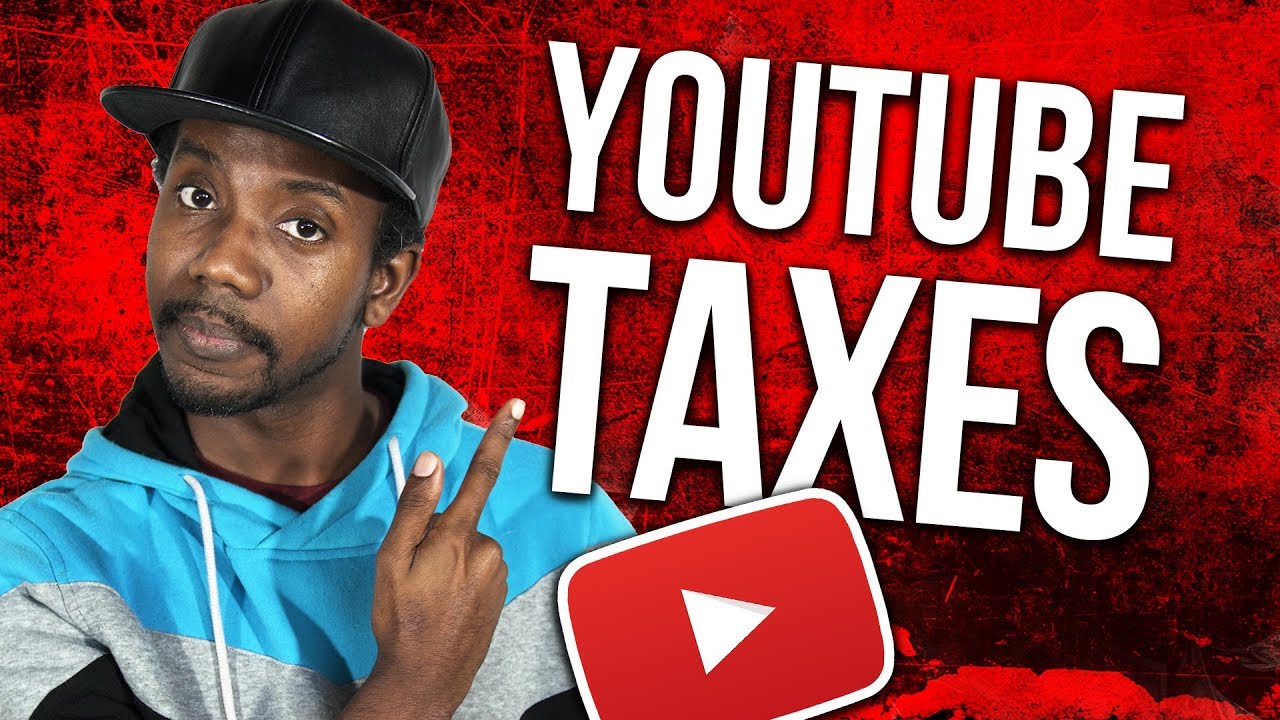Understanding YouTube taxes is crucial for any content creator who monetizes their videos. While the platform offers amazing opportunities to generate income, it also comes with certain tax obligations that can be a bit overwhelming without proper guidance. Think of it as a double-edged sword: the more you earn, the more you need to understand how to manage your taxes. In this blog post, we’ll break down everything you need to know about YouTube taxes, from what defines a content creator to the nitty-gritty of tax filing.
Who is Considered a Content Creator?

When it comes to YouTube, the term "content creator" encompasses a diverse group of individuals who produce and share videos on the platform. But who exactly fits the bill? Let's break it down:
- Full-time YouTubers: These are individuals who have made a career out of their YouTube channel, relying on it as their primary source of income.
- Part-time content creators: Many users create videos as a side hustle while maintaining other jobs. In this case, their YouTube earnings still qualify them as content creators.
- Influencers: If you're using YouTube to promote products or services, even if you don't have a massive following, you’re considered a content creator. Many brands collaborate with smaller creators.
- Vloggers: Personal journey or lifestyle vloggers share their lives on YouTube. Their channels may not strictly focus on a particular topic but they still generate income through ad revenue, sponsorships, etc.
- Educational channels: Creators who produce tutorial or informative videos that help viewers learn new skills or concepts are also included in this category.
In summary, if you are generating income through your YouTube channel in any capacity, you are considered a content creator. This is important to understand when it comes to your tax liabilities and filing requirements, so stay tuned for our upcoming sections on tax obligations and deductions available for creators!
Also Read This: Why 123RF Is Your Ultimate Destination for Creative Solutions
3. Tax Obligations for YouTubers

As a content creator on YouTube, understanding your tax obligations is crucial for staying on the right side of the law. You’re not just earning money for fun; you’re running a business, and with that comes responsibility. Here’s a rundown of what you need to keep in mind.
- Self-Employment Tax: Most YouTubers are considered self-employed. This means you’re responsible for both the employer’s and employee’s portions of Social Security and Medicare taxes. Self-employment tax is usually around 15.3% of your net earnings.
- Estimated Tax Payments: Unlike traditional employees who have taxes withheld from their paycheck, self-employed individuals must pay estimated taxes quarterly. This can be a bit daunting, but if you keep track of your earnings, it becomes manageable. Make sure to calculate and pay estimated taxes to avoid penalties.
- Business Expenses: One of the perks of being a YouTuber is that you can deduct certain expenses that are necessary for your content creation. This might include camera equipment, editing software, and even your home office costs. Knowing what qualifies as a legitimate business expense can significantly lower your taxable income.
- Record Keeping: Staying organized is key to simplifying your tax process. Maintain records of your income and expenses throughout the year. Consider using accounting software or a simple spreadsheet to keep everything in one place.
So, whether you're vlogging your daily life or producing educational videos, remember that keeping tabs on your taxes is a must. Don’t let tax season sneak up on you!
Also Read This: How to Start Your Own Getty Images Page for Contributor Success
4. Types of Income Earned by YouTubers

Being a YouTuber opens up several avenues for income generation. It’s not just about ad revenue; there’s a whole range of income streams you can explore. Here’s a closer look at the different types of income you might earn:
| Income Type | Description |
|---|---|
| Ad Revenue | This is the most common source of income for YouTubers. Once you’re part of the YouTube Partner Program, you earn money from ads that play before, during, or after your videos. |
| Sponsored Content | Brands often pay creators to promote products directly in their videos. This can be a lucrative opportunity if your audience aligns with the brand's target market. |
| Merchandise Sales | Many YouTubers sell their own branded merchandise, such as T-shirts and mugs, as an additional revenue stream. |
| Affiliate Marketing | By promoting products through affiliate links, YouTubers earn a commission on sales generated from those links. |
| Crowdfunding and Donations | Platforms like Patreon allow fans to support creators directly, offering exclusive content in return. |
As you can see, the potential income for YouTubers goes beyond simply making videos. With a bit of creativity and business savvy, you can build a sustainable income that reflects your brand and audience.
Also Read This: How Often YouTube Views Refresh and Update for Content Creators
Deductions and Expenses for Content Creators
As a content creator on YouTube, it's important to understand that you have a wide range of possible deductions and expenses that can significantly lower your taxable income. Think of these deductions as a way to cancel out some of the revenue you earn, ultimately reducing how much of that money Uncle Sam takes. Here’s a breakdown of what you can deduct:
- Equipment Costs: Cameras, microphones, lighting, and editing software are all essential tools for video production. These can be expensive, so keeping track of receipts and noting these as business expenses is crucial.
- Home Office Deduction: If you have a dedicated space in your home for filming or editing, you may qualify for the home office deduction. This can include a portion of your rent or mortgage, utilities, and internet costs.
- Travel Expenses: If you travel to conferences, events, or locations to create content, those travel costs can be deducted. This includes airfare, hotel stays, meals, and even transportation like taxis or rideshares.
- Marketing and Advertising: Any costs related to promoting your YouTube channel (like social media ads or sponsor partnerships) are also deductible.
- Professional Services: If you hire an accountant or seek legal advice, these costs can be deducted as well.
Remember to keep detailed records of all your expenses—and consult with a tax professional to ensure you’re maximizing your deductions legally and efficiently!
Also Read This: Enhance Your Website’s Aesthetic with High-Quality Photos from Imago Images
Self-Employment Taxes Explained
As a YouTube content creator earning income from your videos, you’re classified as self-employed. This status comes with its own set of tax rules, particularly self-employment taxes. But what does that really mean for you?
In addition to regular income taxes, self-employed individuals must also pay self-employment tax, which primarily covers Social Security and Medicare taxes. Here’s how it typically breaks down:
| Tax Type | Rate |
|---|---|
| Social Security Tax | 12.4% |
| Medicare Tax | 2.9% |
So, if your net earnings from content creation exceed $400 in a tax year, you’ll need to file a Schedule SE with your tax return to report and pay your self-employment taxes.
One silver lining is that you can deduct the employer-equivalent portion of your self-employment tax when calculating your adjusted gross income (AGI) on your tax return. Essentially, you can deduct half of the self-employment tax you owe, which helps reduce your overall tax burden!
Don’t forget: keeping meticulous records of your earnings and expenses will make filing your self-employment taxes a lot smoother each tax season. Consulting a tax professional who understands the nuances of self-employment can be invaluable, guiding you through the intricate tax landscape.
Also Read This: Download Vimeo Video to Mp4 in Less Than a Minute Following These Steps
How to File Taxes as a YouTuber
Filing taxes as a YouTuber can feel a bit daunting at first, especially if you’re juggling content creation with the complexities of tax regulations. But don't worry! I’m here to break it down for you in simple terms.
First things first, managing your income is crucial. You need to keep track of all your revenue streams. These may include:
- Ad revenue from YouTube.
- Sponsorship deals.
- Merchandise sales.
- Affiliate marketing earnings.
- Memberships and super chats.
Next, it’s essential to maintain accurate records for all your expenses related to your content creation. Here’s a list of potential deductions you can claim:
- Equipment (cameras, microphones, lighting).
- Editing software and subscriptions.
- Internet costs.
- Home office space (if applicable).
- Travel expenses for shooting content.
Once you have documented your income and expenses, it’s time to file your taxes. Depending on your earnings, you might want to consider hiring a tax professional who understands the unique landscape of YouTube revenue. Alternatively, you can use tax software tailored for freelancers and self-employed individuals.
Remember, tax deadlines can sneak up on you, so mark your calendar and give yourself plenty of time to gather your documents. Filing your taxes accurately is key to avoiding unwanted penalties!
Also Read This: How to Hide Certificates on LinkedIn
Common Mistakes YouTubers Make with Taxes
As a YouTuber, it’s all too easy to overlook some tax responsibilities, especially if you’re new to generating income online. Let’s chat about some common mistakes many creators make with their taxes.
- Ignoring Income Reporting: Some YouTubers mistakenly think small earnings don’t need to be reported. In reality, all income earned is taxable, no matter how small.
- Neglecting to Keep Receipts: Not keeping track of expenses can lead to missing out on valuable deductions. Keep a system in place for storing receipts and invoices.
- Failing to Pay Estimated Taxes: As a freelancer, you’re often responsible for paying estimated taxes quarterly. Failing to do so can lead to penalties and interests later on.
- Mixing Personal and Business Finances: Avoid using the same bank account for personal and business transactions. A dedicated business account will simplify tracking your earnings and expenses.
- Missing Deadlines: Tax deadlines are crucial! Late filings can result in costly penalties, so make sure you're aware of and adhere to them.
By being aware of these common pitfalls, you can better navigate the tax landscape as a content creator. It’s all about staying organized and informed!
Understanding YouTube Taxes for Content Creators
As a content creator on YouTube, understanding your tax obligations is crucial to ensuring compliance and maximizing your earnings. This responsibility can be daunting, but with the right knowledge, you can navigate the complexities of the tax system.
When you earn money on YouTube, either through ad revenue, sponsorships, or merchandise sales, this income is generally considered taxable by the IRS (United States). Here are some key points to consider:
- Self-Employment Tax: If you are earning money through your YouTube channel, you are likely considered self-employed, meaning you must pay self-employment tax in addition to income tax.
- Income Reporting: Income generated from YouTube must be reported on your tax return, including earnings from AdSense and affiliate marketing.
- Estimated Taxes: You may need to make estimated tax payments throughout the year if your tax liability is expected to be $1,000 or more.
- Tax Deductions: You can deduct specific business expenses associated with your content creation, such as equipment purchases, software subscriptions, and travel expenses.
Here’s a brief table to summarize potential deductible expenses:
| Expense Type | Description |
|---|---|
| Equipment | Camera, microphones, lighting, computers |
| Software | Editing software, graphic design tools |
| Marketing | Social media ads, website costs |
| Home Office | Portion of rent/utilities used for work |
In conclusion, understanding YouTube taxes is essential for content creators to maintain compliance and maximize deductions. By staying informed about your tax responsibilities, you can focus on creating content while ensuring that you meet legal obligations.
 admin
admin








